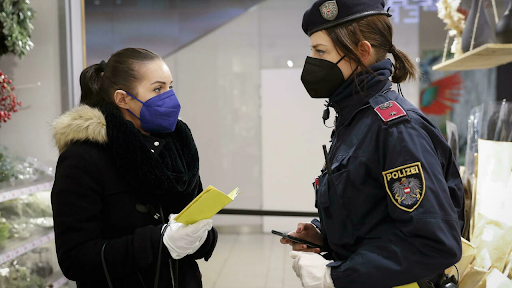Austria Enacts Sweeping Vaccine Mandate
A woman receives a vaccine in Salzburg, Austria. Lukas Barth/Reuters
Austria became the first European democracy to institute a sweeping vaccine mandate for nearly its entire adult population on Friday. The move is regarded as a bellwether for other countries struggling to increase vaccination rates as the coronavirus pandemic enters its third year.
The mandate, which will be in effect until Jan. 31, 2024, was signed into law by President Alexander Van der Bellen after passing both houses of Austria’s parliament.
The directive will be implemented in three primary phases. First, the government will send a letter by post to every Austrian citizen by March 15, detailing the mandate and any pertinent deadlines. Exemptions will be made for pregnant women, individuals with conditions that preclude them from receiving a vaccine, and anyone who has tested positive for the virus in the last 180 days.
In this first phase, Austria’s previous restrictions, particularly the country’s “lockdown for the unvaccinated,” will end. This will allow anyone - regardless of vaccination status - to leave their homes for nonessential reasons. Furthermore, the government will not yet begin to fine unvaccinated individuals for failing to comply.
In phase two, starting on March 15, Austrian police will begin to conduct random, public status checks, including during traffic stops. If unable to produce proof of vaccination, Austrian individuals will be fined upwards of 600 euros (about $675). If contested, the fine could reach 3600 euros, or $4,100.
In the third phase of the mandate, for which a start date is yet to be determined, the Austrian government will create a formal vaccine registry and begin to automatically assess fines. However, if pandemic conditions improve, this phase may not be put into action.
Like other nations in Western and Central Europe, the debate over whether to institute a sweeping vaccine mandate has gripped Austrian politics. Recent polling suggests that 60% of the country supports the mandate, however, many remain strongly opposed; a fact indicated by numerous protests over the past few months, involving tens of thousands of protesters who have objected to the government’s previous restrictions.
A police officer inspects a woman’s vaccination status inside a shopping mall in Vienna, Austria during the country’s “lockdown for the unvaccinated” last month. Lisa Leutner /AP
Austria has a relatively low rate of vaccination, 75.8%, when compared to its European counterparts, a reality that has led to persistently high rates of infection and hospitalization.
Officials in Europe have tried to encourage higher vaccination rates, both with incentives and escalating restrictions, but neither tactic has proven particularly effective. This final, stringent option - a universal vaccine mandate - seemed, to many Austrian officials, as the only alternative.
Elsewhere in Europe, public officials are facing near-identical dilemmas. A variety of countries are attempting to quell the pandemic with a blend of assorted restrictions and vaccine mandates.
After attempting a series of national and regional restrictions to mixed success, the German government, now led by Chancellor Olaf Scholz, is considering instituting a sweeping vaccine law similar to Austria’s. Meanwhile, countries such as Italy and Greece - nations with older populations - enacted mandates for adults above certain ages.
In France, President Emmanuel Macron hasn’t indicated whether he will pursue a widespread vaccine mandate but announced his intention to “piss off” the unvaccinated by ramping up restrictions on those who have not yet received a jab.
Austria’s new law will be an important indicator for European leaders, many of whom are uncertain if a vaccine mandate will be entirely enforceable, let alone desirable.


